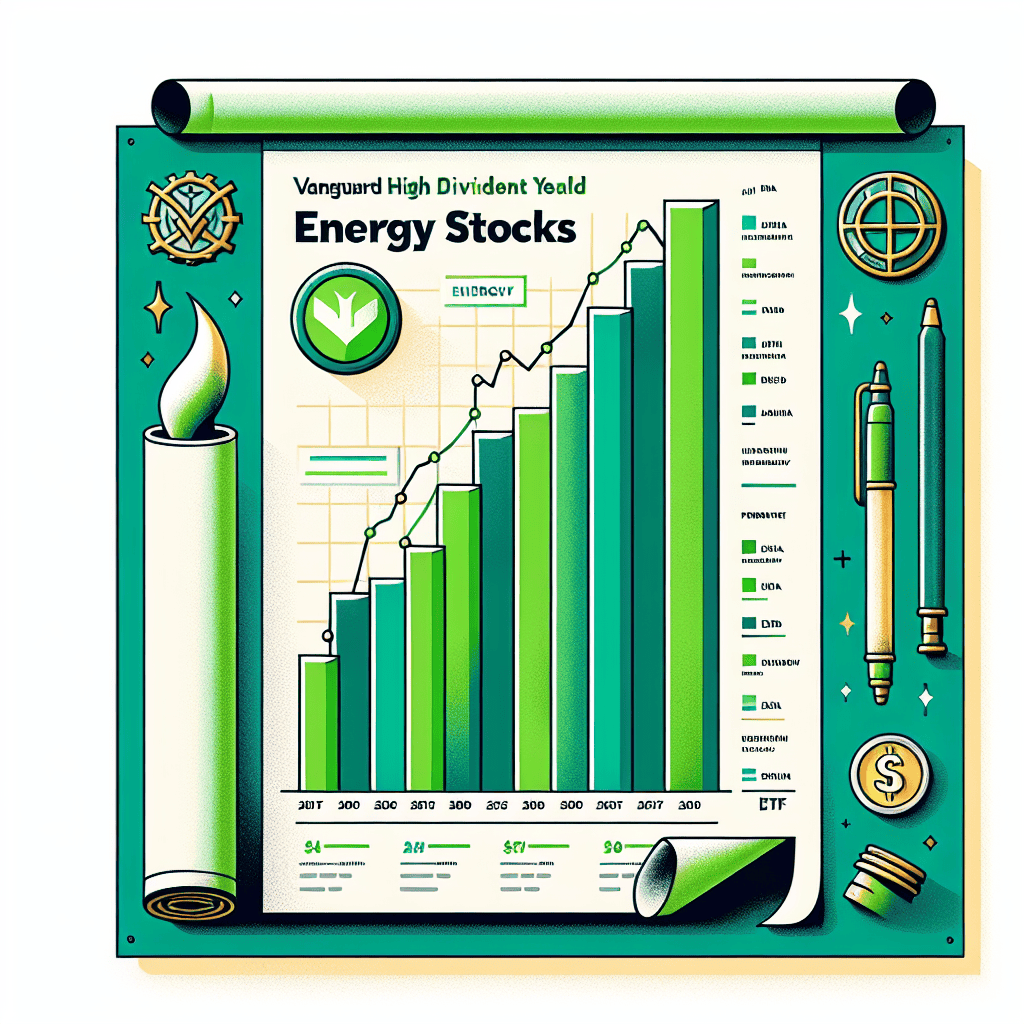“Power Up Your Portfolio: Top High-Yield Energy Stocks in Vanguard’s High Dividend Yield ETF”
Introduction
The Vanguard High Dividend Yield ETF (VYM) is a popular investment vehicle for those seeking exposure to high-yield dividend stocks, offering a diversified portfolio that includes some of the most robust and reliable companies across various sectors. Within this ETF, the energy sector plays a significant role, featuring companies that not only provide essential services and products but also offer attractive dividend yields. These high-yield energy stocks are often characterized by their strong cash flow, stable business models, and commitment to returning capital to shareholders through dividends. As the global demand for energy continues to evolve, these companies remain pivotal, balancing traditional energy production with innovative approaches to meet future needs. Investors looking for income generation and potential capital appreciation may find these energy stocks within the Vanguard High Dividend Yield ETF to be compelling additions to their portfolios.
Overview Of Vanguard High Dividend Yield ETF
The Vanguard High Dividend Yield ETF (VYM) is a popular investment vehicle for those seeking exposure to high-yielding stocks, particularly within the energy sector. This ETF is designed to track the performance of the FTSE High Dividend Yield Index, which comprises companies characterized by above-average dividend yields. As investors increasingly seek income-generating assets, the energy sector within this ETF has garnered significant attention due to its potential for both robust dividends and capital appreciation.
Energy stocks within the Vanguard High Dividend Yield ETF are particularly appealing due to their ability to generate substantial cash flows, which are often distributed to shareholders in the form of dividends. This sector includes a diverse range of companies, from integrated oil and gas giants to specialized firms focusing on renewable energy. The inclusion of these companies in the ETF provides investors with a balanced exposure to traditional and emerging energy sources, thereby enhancing the potential for stable returns.
One of the top high-yield energy stocks in the Vanguard High Dividend Yield ETF is ExxonMobil. As one of the largest publicly traded oil and gas companies globally, ExxonMobil has a long-standing history of paying consistent and attractive dividends. The company’s integrated business model, which spans exploration, production, refining, and distribution, allows it to maintain financial stability even during volatile market conditions. This stability is crucial for sustaining its dividend payouts, making it a reliable choice for income-focused investors.
Similarly, Chevron is another prominent energy stock within the ETF that offers a high dividend yield. Chevron’s strategic investments in both traditional fossil fuels and renewable energy projects position it well for future growth. The company’s commitment to maintaining a strong balance sheet and disciplined capital allocation further supports its ability to deliver consistent dividends. As the energy landscape evolves, Chevron’s diversified approach ensures that it remains a competitive player, thereby safeguarding its dividend-paying capacity.
In addition to these oil and gas behemoths, the ETF also includes companies like NextEra Energy, which is a leader in the renewable energy sector. NextEra Energy’s focus on clean energy solutions, such as wind and solar power, aligns with the global shift towards sustainable energy sources. This strategic positioning not only enhances its growth prospects but also contributes to its ability to offer attractive dividends. As the demand for renewable energy continues to rise, NextEra Energy’s inclusion in the ETF provides investors with exposure to a rapidly expanding market segment.
Moreover, the presence of midstream companies like Kinder Morgan in the ETF adds another layer of diversification. Midstream companies, which are involved in the transportation and storage of energy products, typically generate stable cash flows through long-term contracts. This stability translates into reliable dividend payments, making them an appealing choice for income-seeking investors. Kinder Morgan’s extensive network of pipelines and storage facilities positions it as a key player in the energy infrastructure space, further enhancing its dividend-paying potential.
In conclusion, the Vanguard High Dividend Yield ETF offers investors a compelling opportunity to gain exposure to high-yield energy stocks. By including a mix of traditional oil and gas companies, renewable energy leaders, and midstream firms, the ETF provides a diversified approach to capturing income from the energy sector. This diversification not only mitigates risk but also enhances the potential for stable and attractive returns, making it an appealing choice for those seeking to bolster their investment portfolios with high-yield energy stocks.
Top Energy Stocks In Vanguard’s Portfolio
The Vanguard High Dividend Yield ETF is a popular choice among investors seeking a steady stream of income through dividends. This ETF is designed to track the performance of the FTSE High Dividend Yield Index, which includes companies characterized by their high dividend yields. Within this diverse portfolio, the energy sector stands out as a significant contributor to the fund’s overall performance. Energy stocks are known for their robust dividend payouts, making them attractive to income-focused investors. As we delve into the top high-yield energy stocks within Vanguard’s portfolio, it is essential to understand the factors that make these companies appealing.
Firstly, ExxonMobil Corporation is a prominent player in the energy sector and a key component of the Vanguard High Dividend Yield ETF. As one of the largest publicly traded oil and gas companies globally, ExxonMobil has a long-standing history of delivering consistent dividends to its shareholders. The company’s integrated business model, which spans exploration, production, refining, and distribution, provides a stable revenue stream. This stability, coupled with its commitment to returning capital to shareholders, makes ExxonMobil a cornerstone of the ETF’s energy holdings.
Transitioning to another major player, Chevron Corporation also holds a significant position within the ETF. Chevron’s strong financial performance and strategic investments in both traditional and renewable energy sources underscore its commitment to sustainable growth. The company’s ability to generate substantial cash flow, even amid volatile oil prices, enables it to maintain a competitive dividend yield. Chevron’s focus on operational efficiency and cost management further enhances its appeal to dividend-seeking investors.
In addition to these oil giants, the ETF includes ConocoPhillips, a company renowned for its focus on exploration and production. ConocoPhillips has strategically positioned itself to capitalize on high-margin opportunities, particularly in the United States. Its disciplined approach to capital allocation and emphasis on shareholder returns have resulted in a compelling dividend profile. As the company continues to optimize its portfolio and enhance its operational efficiency, it remains a vital component of Vanguard’s energy holdings.
Moreover, the ETF’s exposure to the energy sector is not limited to traditional oil and gas companies. It also includes companies like NextEra Energy, which is a leader in renewable energy. NextEra Energy’s commitment to clean energy solutions and its extensive portfolio of wind and solar projects make it a unique addition to the ETF. The company’s ability to generate consistent cash flow from its renewable assets supports its dividend payments, offering investors a blend of growth and income potential.
Furthermore, the inclusion of Kinder Morgan, a leading energy infrastructure company, highlights the ETF’s diversified approach to the energy sector. Kinder Morgan’s extensive network of pipelines and storage facilities positions it as a critical player in the transportation and storage of natural gas and other energy products. The company’s stable cash flow from long-term contracts supports its attractive dividend yield, making it a valuable asset within the ETF.
In conclusion, the Vanguard High Dividend Yield ETF’s energy holdings offer a diverse mix of traditional and renewable energy companies, each contributing to the fund’s overall dividend yield. By including industry leaders like ExxonMobil, Chevron, ConocoPhillips, NextEra Energy, and Kinder Morgan, the ETF provides investors with exposure to a sector that is both dynamic and essential to the global economy. As these companies continue to navigate the evolving energy landscape, their commitment to shareholder returns remains a key factor in their appeal to income-focused investors.
Analyzing Dividend Yields Of Energy Stocks
The Vanguard High Dividend Yield ETF (VYM) is a popular choice among investors seeking steady income through dividends. This ETF focuses on high-yielding stocks, providing exposure to a diverse array of sectors, including the energy sector, which is known for its robust dividend payouts. Within this sector, several companies stand out due to their substantial dividend yields, making them attractive to income-focused investors.
To begin with, ExxonMobil Corporation is a prominent player in the energy sector and a significant component of the Vanguard High Dividend Yield ETF. Known for its integrated operations across the oil and gas industry, ExxonMobil has consistently delivered strong dividend yields. The company’s commitment to returning capital to shareholders is evident in its long-standing history of dividend payments, which have been maintained even during periods of market volatility. This stability is largely attributed to ExxonMobil’s diversified portfolio and its strategic investments in both upstream and downstream operations.
Similarly, Chevron Corporation is another key energy stock within the ETF that offers a compelling dividend yield. Chevron’s financial strength and operational efficiency have enabled it to sustain its dividend payments over the years. The company’s focus on cost management and capital discipline has allowed it to navigate the cyclical nature of the energy market effectively. Moreover, Chevron’s investments in renewable energy and technology-driven solutions underscore its commitment to long-term growth, further enhancing its appeal to dividend-seeking investors.
In addition to these oil giants, the ETF also includes midstream companies like Kinder Morgan, Inc., which play a crucial role in the energy supply chain. Kinder Morgan’s business model, centered around the transportation and storage of energy products, provides a stable cash flow, supporting its ability to pay attractive dividends. The company’s extensive network of pipelines and terminals positions it well to benefit from the ongoing demand for energy infrastructure, making it a reliable choice for those seeking high yields.
Furthermore, the inclusion of companies like Phillips 66 adds diversity to the energy holdings within the ETF. As a leading player in the refining and marketing segment, Phillips 66 benefits from its integrated business model, which includes refining, midstream, and chemicals operations. This diversification allows the company to generate consistent cash flows, supporting its dividend payments. Additionally, Phillips 66’s strategic initiatives to enhance operational efficiency and expand its petrochemical footprint contribute to its long-term dividend sustainability.
While these energy stocks offer attractive dividend yields, it is essential for investors to consider the inherent risks associated with the sector. The energy market is subject to fluctuations in commodity prices, regulatory changes, and geopolitical tensions, all of which can impact the financial performance of these companies. Therefore, a thorough analysis of each company’s financial health, management strategy, and market position is crucial before making investment decisions.
In conclusion, the Vanguard High Dividend Yield ETF provides exposure to some of the top high-yield energy stocks, offering investors an opportunity to benefit from the sector’s dividend potential. Companies like ExxonMobil, Chevron, Kinder Morgan, and Phillips 66 exemplify the ETF’s focus on reliable dividend payers. However, investors must remain vigilant and consider the broader market dynamics when evaluating these stocks. By doing so, they can make informed decisions that align with their income objectives and risk tolerance.
Performance Trends Of Energy Stocks In The ETF

The Vanguard High Dividend Yield ETF, known for its focus on providing investors with exposure to high-yielding stocks, has consistently attracted attention due to its diverse portfolio. Among the various sectors represented, energy stocks have emerged as a significant component, offering both potential growth and attractive dividend yields. As the global energy landscape continues to evolve, understanding the performance trends of energy stocks within this ETF becomes crucial for investors seeking to optimize their portfolios.
In recent years, energy stocks have experienced a resurgence, driven by a combination of factors including fluctuating oil prices, advancements in renewable energy technologies, and geopolitical developments. Within the Vanguard High Dividend Yield ETF, energy stocks have demonstrated a robust performance, contributing to the overall yield of the fund. This performance can be attributed to several key players in the energy sector that have consistently delivered strong financial results and maintained a commitment to returning capital to shareholders through dividends.
One of the standout performers in the ETF is ExxonMobil, a company with a long-standing history in the energy industry. Despite facing challenges such as regulatory pressures and market volatility, ExxonMobil has managed to sustain its dividend payments, making it an attractive option for income-focused investors. The company’s strategic investments in both traditional and renewable energy sources have positioned it well to navigate the transition towards cleaner energy, thereby enhancing its long-term growth prospects.
Similarly, Chevron has also played a pivotal role in bolstering the performance of energy stocks within the ETF. Known for its disciplined capital management and strong balance sheet, Chevron has consistently delivered competitive dividends. The company’s focus on operational efficiency and cost management has enabled it to weather market fluctuations effectively. Furthermore, Chevron’s investments in low-carbon technologies underscore its commitment to sustainability, aligning with the growing demand for environmentally responsible energy solutions.
In addition to these oil giants, the ETF also includes companies like ConocoPhillips, which have shown resilience in adapting to changing market dynamics. ConocoPhillips has strategically divested non-core assets and optimized its portfolio to focus on high-margin projects. This approach has not only strengthened its financial position but also allowed it to enhance shareholder returns through dividends and share buybacks. As a result, ConocoPhillips remains a key contributor to the ETF’s high-yield profile.
While traditional energy companies continue to dominate the ETF’s energy holdings, the inclusion of renewable energy firms reflects the sector’s evolving landscape. Companies such as NextEra Energy have gained prominence due to their leadership in renewable energy generation. NextEra’s commitment to expanding its clean energy portfolio has not only driven its growth but also provided a hedge against the volatility associated with fossil fuel markets. This diversification within the energy sector of the ETF offers investors exposure to both stability and innovation.
In conclusion, the performance trends of energy stocks within the Vanguard High Dividend Yield ETF highlight the sector’s dynamic nature and its potential to deliver attractive returns. As the global energy transition accelerates, the ETF’s strategic inclusion of both traditional and renewable energy companies positions it well to capitalize on emerging opportunities. For investors seeking a balanced approach to income generation and growth, the energy stocks in this ETF present a compelling option, underscoring the importance of diversification and adaptability in today’s ever-changing market environment.
Risk Factors For High-Yield Energy Stocks
Investing in high-yield energy stocks can be an attractive proposition for those seeking to enhance their income through dividends. The Vanguard High Dividend Yield ETF, known for its diversified portfolio, includes several energy stocks that offer substantial yields. However, while the allure of high dividends is undeniable, it is crucial to consider the inherent risk factors associated with these investments. Understanding these risks can help investors make informed decisions and manage their portfolios more effectively.
One of the primary risk factors for high-yield energy stocks is the volatility of commodity prices. Energy companies, particularly those involved in oil and gas production, are heavily influenced by fluctuations in the prices of these commodities. When prices are high, these companies tend to generate significant profits, which can lead to increased dividend payouts. Conversely, when prices fall, profits can diminish rapidly, potentially resulting in reduced dividends or even losses. This volatility can be attributed to a variety of factors, including geopolitical tensions, changes in supply and demand dynamics, and macroeconomic conditions.
In addition to commodity price volatility, regulatory and environmental risks also pose significant challenges to high-yield energy stocks. The energy sector is subject to stringent regulations aimed at reducing environmental impact and promoting sustainable practices. Compliance with these regulations can be costly, and any changes in policy can have profound effects on the operations and profitability of energy companies. For instance, stricter emissions standards or increased taxes on carbon emissions could lead to higher operational costs, thereby affecting the companies’ ability to maintain high dividend yields.
Moreover, technological advancements and the global shift towards renewable energy sources present another layer of risk. As the world increasingly embraces cleaner energy alternatives, traditional energy companies may face declining demand for fossil fuels. This transition could lead to stranded assets and necessitate significant capital investments in new technologies, which might strain financial resources and impact dividend sustainability. Investors must consider the adaptability of energy companies in the face of these changes and their strategies for transitioning to a low-carbon future.
Financial health and management practices also play a crucial role in determining the risk profile of high-yield energy stocks. Companies with high levels of debt may find it challenging to sustain dividend payments during periods of financial stress. It is essential for investors to assess the balance sheets of these companies, paying close attention to debt levels, cash flow stability, and the ability to cover dividend payments. Additionally, management’s track record in navigating industry challenges and making prudent capital allocation decisions can provide insights into the company’s long-term viability.
Lastly, geopolitical risks cannot be overlooked when evaluating high-yield energy stocks. Many energy companies operate in regions that are politically unstable or prone to conflict. Such geopolitical tensions can disrupt production, affect supply chains, and lead to sudden changes in market conditions. Investors should be aware of the geographical diversification of the companies within the ETF and consider how geopolitical developments might impact their operations and financial performance.
In conclusion, while high-yield energy stocks within the Vanguard High Dividend Yield ETF offer attractive income potential, they come with a set of risks that investors must carefully evaluate. By understanding the impact of commodity price volatility, regulatory changes, technological shifts, financial health, and geopolitical factors, investors can better navigate the complexities of the energy sector and make informed decisions that align with their investment goals.
Comparing Energy Stocks In Vanguard ETF
The Vanguard High Dividend Yield ETF (VYM) is a popular choice among investors seeking exposure to high-yielding stocks, and within this ETF, the energy sector plays a significant role. Energy stocks are often favored for their potential to provide substantial dividends, making them attractive to income-focused investors. In this context, it is essential to examine some of the top high-yield energy stocks within the Vanguard High Dividend Yield ETF to understand their appeal and potential impact on an investment portfolio.
To begin with, ExxonMobil Corporation stands out as a prominent energy stock within the ETF. As one of the largest publicly traded oil and gas companies globally, ExxonMobil has a long-standing history of paying dividends. The company’s integrated business model, which spans exploration, production, refining, and distribution, provides a diversified revenue stream that supports its dividend payments. Furthermore, ExxonMobil’s commitment to maintaining a strong balance sheet and its strategic investments in low-carbon technologies underscore its resilience in the face of fluctuating oil prices and evolving energy demands.
Similarly, Chevron Corporation is another key player in the energy sector represented in the Vanguard High Dividend Yield ETF. Chevron’s robust dividend yield is supported by its extensive global operations and a focus on capital discipline. The company’s strategic initiatives, such as expanding its liquefied natural gas (LNG) capabilities and investing in renewable energy projects, highlight its adaptability to changing market conditions. Chevron’s ability to generate substantial cash flow, even during periods of market volatility, reinforces its position as a reliable dividend payer.
In addition to these oil giants, the ETF also includes energy infrastructure companies like Kinder Morgan, Inc. Kinder Morgan is one of the largest energy infrastructure companies in North America, specializing in the transportation and storage of natural gas, crude oil, and refined petroleum products. The company’s business model, which relies on long-term contracts and fee-based revenues, provides a stable cash flow that supports its dividend payments. Moreover, Kinder Morgan’s strategic focus on expanding its natural gas infrastructure aligns with the growing demand for cleaner energy sources, positioning it well for future growth.
Furthermore, it is worth noting the presence of Phillips 66, a diversified energy manufacturing and logistics company, within the ETF. Phillips 66 operates in refining, midstream, chemicals, and marketing, offering a comprehensive approach to the energy value chain. The company’s commitment to returning capital to shareholders through dividends and share repurchases is a testament to its financial strength and operational efficiency. Additionally, Phillips 66’s investments in renewable fuels and advanced technologies reflect its proactive approach to sustainability and long-term value creation.
In conclusion, the energy stocks within the Vanguard High Dividend Yield ETF offer a compelling mix of high dividend yields and strategic growth initiatives. Companies like ExxonMobil, Chevron, Kinder Morgan, and Phillips 66 exemplify the potential for stable income generation and resilience in a dynamic energy landscape. As investors consider their options within the ETF, these energy stocks provide a valuable opportunity to balance income needs with exposure to a sector that is both essential and evolving. By understanding the strengths and strategies of these companies, investors can make informed decisions that align with their financial goals and risk tolerance.
Future Outlook For Energy Stocks In The ETF
The future outlook for energy stocks within the Vanguard High Dividend Yield ETF (VYM) is a topic of considerable interest for investors seeking both income and growth. As the global energy landscape continues to evolve, driven by technological advancements and shifting regulatory frameworks, the energy sector remains a pivotal component of the ETF’s portfolio. This sector’s performance is influenced by a myriad of factors, including geopolitical dynamics, supply and demand fluctuations, and the ongoing transition towards renewable energy sources. Consequently, understanding the potential trajectory of high-yield energy stocks within VYM requires a nuanced analysis of these elements.
To begin with, the energy sector is traditionally known for its cyclical nature, with stock performance often tied to the broader economic environment. In recent years, however, the sector has been undergoing a transformation, spurred by the increasing emphasis on sustainability and the global push towards reducing carbon emissions. This shift has led to a growing interest in renewable energy sources, such as wind, solar, and hydroelectric power, which are gradually gaining a larger share of the energy market. As a result, companies that are actively investing in and transitioning to cleaner energy solutions are likely to be well-positioned for future growth, potentially enhancing their appeal within the ETF.
Moreover, the geopolitical landscape plays a crucial role in shaping the future of energy stocks. Tensions in key oil-producing regions, such as the Middle East, can lead to supply disruptions, impacting oil prices and, consequently, the profitability of energy companies. Additionally, trade policies and international agreements, such as the Paris Agreement, influence the regulatory environment, encouraging companies to adopt more sustainable practices. These factors can create both challenges and opportunities for energy stocks within VYM, as companies that successfully navigate these complexities may experience enhanced stability and growth prospects.
In addition to geopolitical considerations, technological advancements are reshaping the energy sector. Innovations in energy storage, grid infrastructure, and efficiency improvements are enabling companies to optimize their operations and reduce costs. For instance, advancements in battery technology are making renewable energy sources more viable by addressing intermittency issues, thereby increasing their competitiveness against traditional fossil fuels. Companies that leverage these technologies effectively are likely to gain a competitive edge, potentially boosting their performance within the ETF.
Furthermore, the financial health and dividend policies of energy companies are critical factors influencing their attractiveness within VYM. High-yield energy stocks are particularly appealing to income-focused investors, as they offer the potential for regular dividend payments. However, it is essential to assess the sustainability of these dividends, as companies with strong balance sheets and prudent capital allocation strategies are better equipped to maintain and grow their payouts over time. This financial resilience is especially important in a sector characterized by volatility and uncertainty.
In conclusion, the future outlook for energy stocks in the Vanguard High Dividend Yield ETF is shaped by a complex interplay of factors, including the transition to renewable energy, geopolitical dynamics, technological advancements, and financial health. As the energy sector continues to evolve, companies that adapt to these changes and demonstrate resilience are likely to emerge as leaders, offering attractive opportunities for investors seeking high yields and long-term growth. By carefully analyzing these elements, investors can make informed decisions about the potential of energy stocks within VYM, positioning themselves to capitalize on the sector’s future prospects.
Q&A
1. **Question:** What is the Vanguard High Dividend Yield ETF?
**Answer:** The Vanguard High Dividend Yield ETF (VYM) is an exchange-traded fund that focuses on providing investors with exposure to high-yielding dividend stocks, primarily from large-cap companies.
2. **Question:** Which energy sector company is a top holding in the Vanguard High Dividend Yield ETF?
**Answer:** ExxonMobil Corporation (XOM) is a top energy sector holding in the Vanguard High Dividend Yield ETF.
3. **Question:** What is another major energy company included in the Vanguard High Dividend Yield ETF?
**Answer:** Chevron Corporation (CVX) is another major energy company included in the Vanguard High Dividend Yield ETF.
4. **Question:** How does the Vanguard High Dividend Yield ETF select its energy stocks?
**Answer:** The ETF selects its energy stocks based on their dividend yield, focusing on companies that consistently pay high dividends.
5. **Question:** What is the dividend yield of ExxonMobil, a top energy stock in the ETF?
**Answer:** As of the latest data, ExxonMobil’s dividend yield is approximately 3-4%, though this can fluctuate with market conditions.
6. **Question:** Why are energy stocks like Chevron attractive to the Vanguard High Dividend Yield ETF?
**Answer:** Energy stocks like Chevron are attractive due to their strong cash flow, stable dividend payments, and potential for capital appreciation.
7. **Question:** What is the risk associated with investing in high-yield energy stocks within the ETF?
**Answer:** The risk includes market volatility, fluctuating oil and gas prices, and regulatory changes that can impact profitability and dividend sustainability.
Conclusion
The Vanguard High Dividend Yield ETF (VYM) is known for its focus on providing investors with exposure to high-yielding dividend stocks, including those in the energy sector. Top high-yield energy stocks within this ETF typically include major integrated oil and gas companies, which are known for their robust dividend payouts and strong cash flow generation. These companies often benefit from stable demand for energy products and have the financial strength to maintain or grow their dividends even during periods of market volatility. As a result, they can offer investors a combination of income and potential capital appreciation. However, it’s important for investors to consider the inherent volatility of the energy sector, which can be influenced by factors such as fluctuating commodity prices, regulatory changes, and shifts in global energy demand. Overall, high-yield energy stocks in the Vanguard High Dividend Yield ETF can be an attractive option for income-focused investors seeking exposure to the energy sector, but they should be mindful of the associated risks.





